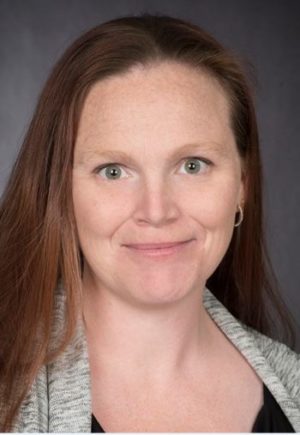
Sarah is a Research Officer in the Neuroscience of Insect Vision Laboratory, led by Professor Karin Nordström. The lab uses hoverflies as a model to better understand how the nervous system codes visual information. Using a wide range of techniques, the research includes recordings from single neurons in the brain and the descending nerve chord, tethered and free flight behavioural experiments as well as field work studies.
Part of Sarah’s role is to record from neurons in the descending nerve cord of the hoverfly. These neurons carry sensory information form the brain to the motor output ganglia in the body. Her aim is to reveal how these neurons respond to visual stimuli, and how these responses vary from the equivalent neurons in the brain. This is an important step in understanding how visual information is processed and ultimately leads to visually driven behaviours, such as target tracking and obstacle avoidance.
What is your professional background? I started working at Flinders in 2002 after completing a Bachelor of Biotechnology. I was on a one year contract which suited me just fine back then – I was unsure if a career in research was the right fit for me so thought I’d take a year of two to find out. Fast forward to now and I’m still here! Apart from short periods of maternity leave, I’ve never left.
I’ve changed research groups several times in that period due to funding shortfalls but I’ve been very lucky because I’ve never needed to move far to find my next opportunity, only a few doors up or down the same corridor in the Flinders Medical Centre. This is quite common for professional research staff: short-term grant funded contracts mean you need to be versatile enough (and lucky enough!) to move to another research group if funding runs out and an opportunity arises elsewhere.
Unfortunately, not all of my colleagues have been as lucky as myself, and I have over the years watched as a number of my peers have left a career in research due to funding shortfalls. Instead of relying on luck and good timing, I wanted to do something to ensure there are more opportunities for research staff throughout their careers and especially at the end of contracts. My colleague Carlie Delaine and I (with support from the College Executive) are setting-up a group to identify opportunities to enhance job security, strengthen and formalise a peer-to-peer support network, and foster a greater sense of belonging and collegiality.
What led you to a professional research staff career? Was there a seminal moment?
When I first started a Flinders, I was part of a large research group led by Professor Marcello Costa and Professor Simon Brookes. It was impossible not to get drawn in by the commitment, passion and enthusiasm they displayed for their research. It also helps that I am naturally curious: I need to know how and why things work.
Who inspires you? Part of the privilege of working at a university is being surrounded by a vast and diverse group of people with incredible minds. Anyone who has worked at a university will say the same thing. I’ve been privileged to work with many amazing researchers over almost two decades here at Flinders, and been inspired in many ways and on many levels, from senior researchers patiently teaching me and helping me to hone my dissection and electrophysiology recording techniques, to others instilling in me the importance of an organised and systematic approach to my research. My current supervisor, Karin Nordström, is an inspiration not only for the way she conducts her research but also for the way she continually strives to bring out the best in those around her, myself included.
Do you have a mentor? I’m a mentee as part of the 2020 professional mentoring program run by the Professional Development Unit at Flinders. It’s an excellent initiative and provides me with:
- a fresh unbiased perspective on my career
- encouragement to step out of my comfort zone
- guidance and advice
- critical feedback and cheerleading
What piece of advice would you give to aspiring professional research staff? Ask more questions. It is not only the simplest way to learn, but also a good way to develop innovative solutions.
What do you value most about working at Flinders? The informal open-door policy! You can walk into the lab next door, the lab down the corridor or even the lab two floors down and ask for help, borrow a chemical or share equipment. I just take that for granted, but apparently it’s a very “Flinders” thing.
What couldn’t you live without? My kids. My husband. Coffee. And not necessarily in that order!

